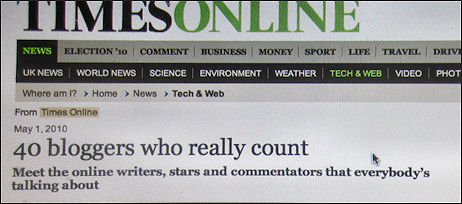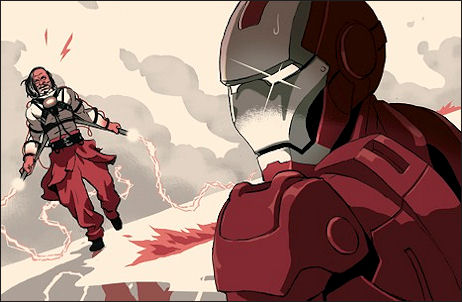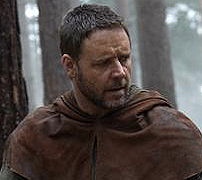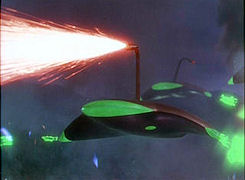Saw this tonight on Sasha Stone‘s Awards Daily, instantly copied and pasted…that’s all.
Day: May 3, 2010
Visual Respite

Albert’s Garden is a community garden located on 2nd Street between 2nd and 3rd Avenues — Monday, 5.3, 7:55 pm.

Thinking Man's Disaster
I wasn’t initially intrigued by the news of Summit’s acquisition of The Impossible until I realized it’s from director Juan Antonio Bayona (The Orphanage). That changes everything. That plus it being a $45 million drama “based around a true story set during and after the Indian Ocean Tsunami in 2004 that incorporates mystery, horror and fiction.” Naomi Watts and Ewan McGregor costar. I’m there.
The last intelligent disaster movie involving a big wave was Peter Weir‘s The Last Wave.
Just A Beard
Every guy knows that growing a beard is a way of saying “fuck it…I’ve just been through a searing drama or trauma of some kind and I’m kinda sick of keeping up with the clean-cut appearance so, you know, I need to go boho for a while.” Some guys grow beards and keep them for years (or all their lives) because they look good and it fits who they are — a different deal altogether. But temporary beards are about expressing emotional recovery, or in some cases an urge to announce a different attitude.
I grew whiskers after losing my job with People magazine in March 1998. I still had my L.A. Times Syndicate column but my Mr. Showbiz column didn’t start until October and I was kind of upset about losing the People income. Growing a scraggly Bob Dylan beard (which is all I’ve ever been able to manage) felt right under the circumstances.
Last night the Hollywood Reporter‘s Andrew Wallenstein opined that in yesterday’s 60 Minutes appearance Conan O’Brien came across as more tragic than comic…a deeply hurt individual licking his wounds for all to see.” Well, sort of but not really. Hurt, yeah, but not deeply. He seemed okay to me, but the beard pretty much said it all.
Early Departure
I’m sorry that Lynn Redgrave has passed at the age of 67. It’s a raw deal to be taken out by breast cancer at a relatively young age, and another jolt for the Redgrave family after the loss of Natasha Richardson (i.e., Lynn’s niece, Vanessa’s daughter) last year and the death of Corin Redgrave, a brother, last month.
Lynn Redgrave was nominated, of course, for Best Supporting Actress in 1999 for her colorful housekeeper turn in Bill Condon‘s Gods and Monsters, and then 32 years before that for her performance in Georgy Girl, which came out in 1967. She had her very first role in Tony Richardson‘s Tom Jones, and — this isn’t exactly significant but it bears mentioning — was the first name actress to engage in a strongly suggestive (if off-screen) oral-sex scene in a mainstream film, i.e., Sidney Lumet‘s Last of the Mobile Hot Shots (1970).
I always thought of Lynn Redgrave more in terms of being respected and well-liked than shall we say incandescently gifted. But whom among us can claim this? In any case my sincerest sympathy and regrets.
London Pallies
Last weekend the Times Online‘s Ben Machell and Killian Fox posted a piece called “40 Bloggers Who Really Count,” and in so doing declared that Hollywood Elsewhere and Nikki Finke‘s Deadline.com dominate in the Hollywood realm. A decent plug if I do say so myself.

“A good Tinseltown blog needs a dash of eccentricity, and Hollywood Elsewhere, home of veteran movie reporter Jeffrey Wells, is deliciously entertaining as well as informative and insightful,” they wrote. “When not goading his legion of readers with fiercely opinionated posts on everything from the Oscars to cinema-going etiquette, he’s airing strongly held political views and curious details from his everyday life. Posts come thick and fast, and he’s as conversant with world movies and classics as he is with the latest 3-D Hollywood juggernaut.”
Seriously, guys — thanks much.
"Weight of Dead Plot"
The Iron Man 2 filmmakers and characters “are so plainly enjoying the ride that to watch [the film] slow and stall, under the weight of dead plot, is a cause for regret,” writes New Yorker critic Anthony Lane.

Director Jon Favreau, screenwriter Justin Theroux and the cast “have a mind to attempt what no other team has done: to take the built-in hyperbole of the genre and treat it as food for laughs. Iron Man’s aspirations are as puffed up as those of Batman, Spider-Man, Watchmen, Fantastic Four, and the rest of the gang, but the telling of his tale feels more leavened and less savage than theirs, and it’s a pity that Favreau didn’t go the whole way and toss out the creaky narrative junk.”
Robin vs. Martians?
Ridley Scott‘s Robin Hood (Universal, 5.14) will have its bicoastal all-media showings on 5.10, but the first peek-out happens tomorrow (same day as the Iron Man 2 all-media screenings). And none too soon for I’m feeling genuine confusion about what the plot and theme may actually be about.


Russell Crowe’s Robin Hood vs. George Pal’s Martin sentinels = potential cinematic bliss.
A 5.2 L.A. Times piece by John Horn, which quotes Scott and producer Brian Grazer and screenwriter Brian Helgeland, states that the basic theme is about throwing the bums out — ridding England of “a king with little concern for his subjects — and “[taking] the country back.”
Except Russell Crowe‘s Robin Hood and his merry band of men “are far less interested in redistributing the wealth than making sure King John (Oscar Isaac) focuses on the people in England,” Horn writes.
But “focuses” in what way exactly? What other issue could there be in the 12th Century except the availability of ample food, clothing and shelter for the general populace? Hasn’t economic inequity been the driving theme of all Robin Hood sagas since the days of Douglas Fairbanks? And yet Horn suggests that King John’s primary failing is about not adequately protecting England from French invaders. One indication of John’s corruption, Horn writes, is that he’s “in cahoots with a villainous adviser (Mark Strong‘s Sir Godfrey) who purports to be English, but he’s as French as foie gras.”
And yet on 4.10 Crowe seemed to tell the Sydney Morning Herald‘s Peter Fitzsimons that economic unfairness is the key element.
“Robin is not a superhero,” he explains. “He doesn’t have a cape. He’s normal. He’s just a bloke. But he’s a man who’s seen a lot of things and understands how it all works. [Going back and forth to the Crusades] he’s been through France, been through Italy, seen the control of the church, been through Greece and he understands that democracy works. He’s seen all of the great empires of his time, come back to his own country and realizes that his own people are the poorest of all, and that things must change.”
In other words, Robin believes that England’s 12th Century poor must stand up to greedy royalists and demand a fairer economic shake — isn’t that what Crowe seems to be saying? So how does this square with Horn’s statement that Robin and the boys are “less interested in redistributing the wealth”? And on top of all this the French are invading?
You know what might work? If Robin and King John and the French had a common enemy — i.e., invading aliens from another planet. That, at least, would result in a clear line. We have Cowboys and Aliens coming out next year, and there’s that Pride and Prejudice and Zombies book. Clearly the current direction is to blend history with the fantastical. A Robin Hood-meets-War of the Worlds flick would have been inspired.
Run Like Thieves
A thought came to me just before dawn. It’s generally presumed that thieves are sociopaths and vice versa, and that the key tenet of a sociopathic personality is an indifference to social codes and standards, which is to say an absence of belief or investment in them. It follows that the most dangerously predatory and destructive thieves of our time — i.e., the big bankers and Wall Street speculators — are grabbing everything they can because they have no faith or trust whatsoever in anything — social cohesion, democratic institutions, or moral tradition even.
The world is a wild jungle, they’re figuring (or rationalizing), and so they must prey on the vulnerable in order to provide for and protect their own.
This is boilerplate stuff, of course — Charles Dickens came to the same conclusions about London industrialists and bankers 150 years ago. The difference today is that diminishing faith in most ethical-moral standards and growing indifference to the general social good is everywhere because fewer and fewer people among the educated ambitious classes believe in the future.
They see the writing on the wall — diminishing natural resources, the world economy essentially built upon a Ponzi scheme, ecological destruction, Jihadists, unsustainable population growth, greater gulfs between the haves and have-nots — and figure the only strategy that makes sense is to accumulate and hoard all you can and in so doing at least protect one’s family or property.
A culture that has no faith in tomorrow and in holding down the social fort for future generations will behave in ways that all but guarantee its own destruction. Because life is not just about now, but about what the current terms of life now will build into and manifest down the road. Except no one’s thinking this way any more.
The seeds of our current nihilist philosophy were evident almost 50 years ago, as Tom Wolfe pointed out in his mid ’70s essay “The Me Decade and the Third Great Awakening.” I recounted the basics of this observation in an August 2009 review of Doug Pray‘s Art and Copy, to wit:
“In 1961 a copywriter in the employ of Foote, Cone & Belding named Shirley Polykoff came up with the line: ‘If I’ve only one life, let me live it as a blonde!’ The basic attitude of having ‘only one life,’ said Wolfe, contradicted a general belief among families and nations that had existed for centuries, which you could sum up as a belief in ‘serial immortality.’
“Boiled down, serial immortality means that we’re all part of a familial stream — our lives being a completion or fulfillment of our parents’ lives and our children’s lives completing and fulfilling our own, and everyone understanding that we’re part of the same genetic river of existence and spirit.
“Polykoff’s copy line, which was written for Clairol hair coloring, basically said ‘the hell with that — it’s just me, it’s just my life and my goals, and I’m going to satisfy myself!’ By the time the early to mid ’70s rolled around the culture had begun to believe in the ‘me first’ philosophy en masse.” And now that philosophy has become a pandemic, and the chickens have come home to roost.
